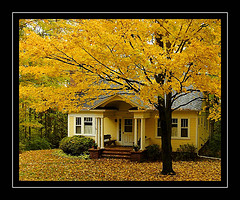 According to a recent US Census report, fewer Americans are moving since such records began in 1948 (NYT). Many homeowners are stuck in a falling real estate market, unemployed, facing foreclosure, and unable to move to new jobs. They are unable to lower mortgages on their houses since the Senate, in response to the mortgage banker lobby, voted against cram-downs. Banks are bulldozing foreclosed houses.
According to a recent US Census report, fewer Americans are moving since such records began in 1948 (NYT). Many homeowners are stuck in a falling real estate market, unemployed, facing foreclosure, and unable to move to new jobs. They are unable to lower mortgages on their houses since the Senate, in response to the mortgage banker lobby, voted against cram-downs. Banks are bulldozing foreclosed houses.
Hopefully, the future will record that we had a crisis, but sized the opportunities afforded by the mounting promises of renewable energy and rode them to success. Hopefully, the future will not record that we were bogged down by the narrow interest of lobbyist and missed this golden opportunity.
The US does more to promote homeownership than any other industrialize nation. The results are: unaffordable housing, poor buildings and infrastructure, urban sprawl, increased pollution and unemployment (The Economist). The present policies must be changed since they cannot support a sustainable “green” economy.
Until recently, the US through agencies such as Fannie Mae and Freddie Mac, with the enthusiastic encouragement of the real estate lobby, tried to guaranteed that house prices would always appreciate. This can’t happen and it didn’t since houses are consumer not capital goods.
Obama said that he was just as outraged by the AIG bonuses as the public, but he claims that we must continue the bailout for the “common good.” He claims that all economists support the bailout. This is not true.
Except for a few Fed hacks, it is difficult to find any economists that back the bailout. Prominent Economists have not been shy in denouncing the bailout. Their opinions have appeared in the popular press. Paul Krugman (Nobel 2008) made the front of News Week and his criticism was featured. He also appeared on GPS and explained his objections to the bailout.
There are many good reasons to own a house, but investing is not one. Homes are places to live; they are not nest eggs. Homeownership should be a life-style and career discussion.
Our economy has reached absurdity. Geithner (Secretary of Treasury at time of post) has produced a “cash for trash” scheme to buy “toxic” (mortgage backed) securities from mortgage bankers who are now bulldozing foreclosed houses. Obama talks about “stabilizing” the housing market, yet he says that we cannot go back to high house prices.
Most economist support Obama’s stimulus package, but think that it should be larger. Most believe that banks will start lending when employment returns.
Patches cannot solve the current crises. We cannot return to a system that siphons off a major portion of our income to support mortgage bankers in a government sponsored Ponzi scheme.
High housing costs increase the costs of manufacture, reduces real saving and investing. They reduce the amount of taxes that people can afford to pay and the amount of home improvements that they can afford. They reduce mobility, increase unemployment, and prevent young adults from leaving home to launch careers or pursue education. (The Economist)
Unemployment is our greatest threat. We need massive government work programs to repair infrastructure and develop renewable energy. Mortgages must be reduced to market value. Lower payments and rent will permit higher community taxes to maintain employment for infrastructure and services after these programs are finished. Greater disposable income will allow homeowners to increase their home’s energy efficiency, increasing its real value.
Photo Credit: fkicker/rAmmoRRison





